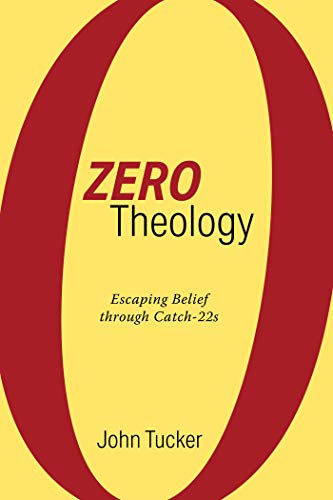Zero Theology
Escaping Belief through Catch-22s

In Zero Theology, John Tucker argues that not only can one be a Christian without holding any traditional beliefs but that one can only be a Christian by getting out of religious belief altogether. Utilizing the philosophy of Ludwig Wittgenstein, John offers a way of escaping the belief/disbelief trap that explains why believers and unbelievers cannot understand each other and why neither understands the alternative religious path that the author promotes.
Tucker addresses many of today’s most pressing religious questions and introduces his own: Why do evangelicals believe that homosexual fidelity is more harmful to marriage than heterosexual infidelity? Why are believers so bothered by science and so impressed by miracles? What if Sin and Grace are synonyms? What if Jesus is sinless in an ironic way? What is the difference between making judgments and passing judgment? Why does the literal versus metaphorical debate completely miss the point of religious language?
Using Catch-22s, ZeroTheology offers a new way of looking at Christian religious life that emphasizes the non-reasonable transcendent choice over the perfectly reasonable choice of belief or unbelief.
Interview with John Tucker
Why have you written this book?
Two reasons; one philosophical and one personal. The philosophical reason is that I perceive that more and more people are tired of being defined as believers or unbelievers but because they lack any alternative descriptors, they feel frustrated and isolated. I want to offer a new way of speaking about religious life. The personal reason is that I want to be more authentic and since the settings I am in always presuppose the belief paradigm, I am never asked the right questions that would allow me to be my authentic self.
Why is this book called “Zero” Theology, are you saying that there should be no theology?
This is a theological book so I cannot say there should be no theology. What I would like to communicate is that theology should stop trying to explain the world. It should make no ontological or scientific claims because that approach assumes that theology is participating in the correspondence of truth enterprise. I like that enterprise by the way, I just don’t think theology should participate in it.
Why have you latched on to Catch-22s and what role do they play in your book?
I am a big fan of Heller’s book. Mainly however, it is because a paradox creates a moment of indecision for the reader. Unlike straightforward claims, where one immediately understands what it would mean to believe or disbelieve, a paradoxical claim invites hesitation and reflection. It is not immediately clear what belief or disbelief would mean. In that moment of hesitation, a kind of wisdom might emerge that is far more profound and important than belief.
What is your target audience with Zero Theology?
My target audience would be thinking people who are dis-satisfied with the current state of western Christian vocabularies. I am thinking of people who are on the fringes but who don’t feel that what they have rejected ought to exclude them from identifying as Christian.
You have written a highly provocative book that could offend both believers and unbelievers alike, what kind of reaction do you anticipate?
I can easily imagine both believers and unbelievers being offended. When I have shared my thoughts with differing groups it is usually the atheists who get most offended. Believers who get offended are probably not my target audience anyway. For atheists, they take pride in what they have rejected and do not like it when someone says that what they rejected should really have never been the point anyway. Having said that, I can also imagine both believers and unbelievers finding the book helpful and not provocative at all.

